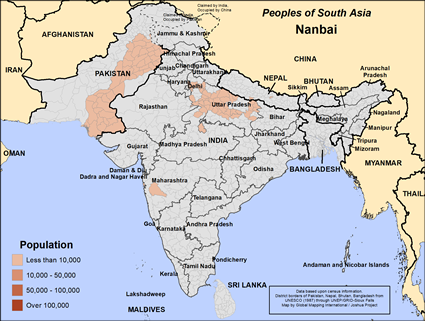Naan is the bread of life throughout South Asia. The Nanbai are a community that are experts in baking this popular bread. The word Nanbai is a Persian word for baker. Most likely these expert naan makers originated from families of cooks that served in the northern Indian courts of Muslim rulers.
The Nanbai speak both Urdu and Hindi. Most Nanbai live in the North Indian state of Uttar Pradesh and a very few live in South India. Many of the Muslim Nanbai migrated to Pakistan after Indian independence in 1947 and have settled in Karachi, Sindh. A few of them live also in Nepal.
A Nanbai might work from home where he has his own equipment, or he might even take his work to the streets. They use their bare hands to knead dough, slap it into shape, and attach it in the oven. Soon, they retrieve it and serve it to their customers. Fathers teach their young sons how to make naan and they carry this skill from generation to generation.
Today, most Nanbai still work as bakers and cooks. Some also run tea stalls.
The Nanbai only marry within their own community. They have no formal clan system. They perceive themselves to be forming part of the prestigious Muslim Shaikh community.
Nanbai people can be either Muslim or Hindu, and they are accepted by both religious communities.
Those who are predominantly Sunni Muslims believe that the supreme God, Allah, spoke through his prophet Mohammed, and taught mankind how to live a righteous life through the Koran and the Hadith. Sunni Muslims follow the teachings of the Koran and consider the first four caliphs to be the rightful successors of Mohammad.
To live a righteous life, they utter the Shahada (a statement of faith), pray five times a day facing Mecca, fast from sunup to sundown during the month of Ramadan, give alms to the poor, and make a pilgrimage to Mecca if they have the means. Muslims are prohibited from drinking alcohol, eating pork, gambling, and stealing, slandering, and making idols. They gather for corporate prayer on Friday afternoons at a mosque, their place of worship.
The two main holidays for Sunni Muslims are Eid al Fitr, the breaking of the monthly fast and Eid al Adha, the celebration of Abraham's willingness to sacrifice his son to Allah.
Sunni religious practices are staid and simple. They believe that Allah has pre-determined our fates and they minimize free will.
In most of the Muslim world, people depend on the spirit world for their daily needs since they regard Allah as too distant. Allah may determine their eternal salvation, but the spirits determine how well they live in their daily lives. For that reason, they try to appease spirits. They use charms and amulets to help them with spiritual forces.
The Nanbai face exploitation by the traders and by the flour mill owners who sell them their essential wheat flour at an inflated price. Then the Nanbai are prohibited from selling naan for a price they deem as fair. To achieve their goal of a fair price for their products, they stage demonstrations and organize peaceful protests by shutting down their naan production from time to time. They need to be able to earn a fair living.
Pray for the Lord to bless the Nanbai community economically and spiritually.
Pray that the Bread of Life, Jesus, will reveal himself to Nanbai community, and be met with open hearts and minds.
Pray that Bibles, Christian literature, and gospel recordings will find their way to Nanbai homes.
Pray for the Lord to send them Urdu speaking gospel workers who will clearly explain Christ and teach them the way of discipleship.
Pray for Muslim background Nanbai disciples to disciple others.
Pray that the people should understand and embrace that Jesus wants to bless their families and neighborhoods.
Scripture Prayers for the Nanbai in Pakistan.
https://en.wikipedia.org/wiki/Nanbai
https://tribune.com.pk/story/2261254/nanbai-association
| Profile Source: Joshua Project |











